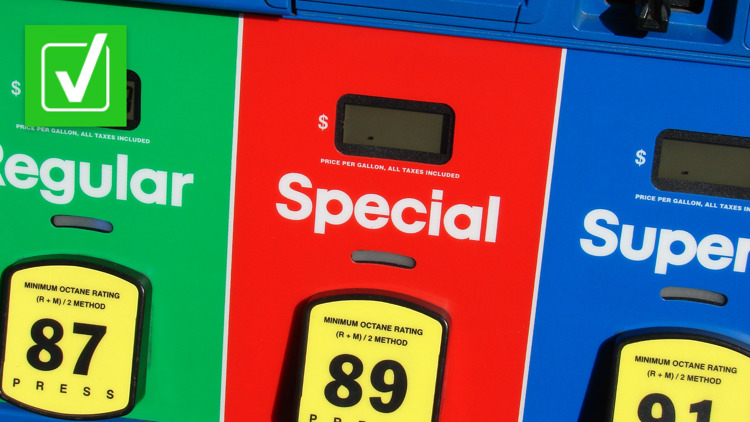UPDATE (03/08/2022): The United States is banning all imports of Russian oil, gas and energy, President Joe Biden announced in a speech at the White House on March 8.
"That means Russian oil will no longer be acceptable at U.S. ports and the American people will deal another powerful blow to Putin's war machine," Biden said.
Biden explained that the decision was made in close consultation with the U.S.'s allies and partners around the world, particularly in Europe.
"The United States produces far more oil domestically than all of the European countries combined. In fact, we're a net exporter of energy. We can take this step when others cannot. But we're working closely with Europe and our partners to develop a long-term strategy to reduce their dependence on Russian energy as well," Biden said.
-----------------------------------------------------
The original story remains as published below:
If you’ve noticed that you’re paying more at the pump in recent weeks, you’re not alone. Gas prices have been steadily rising throughout the United States.
On Feb. 15, Sen. Bernie Sanders (D-Vt.) claimed in a viral tweet that gas prices are at their highest level in seven years. Carla Sands, a candidate for U.S. Senate and ambassador to Denmark during the Trump administration, also wrote in a tweet on Feb. 23 that “Joe Biden’s failed energy policy has already driven gas prices to their highest levels since 2014.”
Viewer Kara also texted VERIFY to ask what the current conflict in Ukraine and Russia means for U.S. gas prices.
THE QUESTION
Are gas prices at their highest levels since 2014?
THE SOURCES
THE ANSWER
Yes, the average U.S. gas price is the highest since 2014. Multiple factors are contributing to the increase, including demand for oil products and the conflict between Russia and Ukraine.
WHAT WE FOUND
The nation’s average gas price is $3.53 per gallon as of Feb. 21, an increase from $3.49 on Feb. 14, according to data from the U.S. Energy Information Administration (EIA).
AAA also listed the national average price for a gallon of gas at $3.53 on Feb. 22 and it has since climbed to $3.54 as of Feb. 24. The nonprofit said on Feb. 22 that the average price per gallon was 21 cents more than it was one month ago and 90 cents more than it was one year ago.
Chris Higginbotham, a spokesperson for EIA, confirmed the average price for gas in the U.S. as of Feb. 21 is the highest it’s been since late July 2014. EIA data shows the U.S. average gas price was about $3.54 per gallon for the week ending July 28, 2014. The highest weekly average gas price that the agency recorded in 2014 was $3.71 per gallon for the week ending April 28.
Andrew Gross, a spokesperson for AAA, also said the current average gas price is the highest it’s been since July 25, 2014, when it reached $3.54 per gallon. The highest price that AAA recorded in 2014 was approximately $3.70 per gallon on April 28.
But why are gas prices so high right now? Multiple factors are contributing to the increase, including conflict between Russia and Ukraine and the demand for oil products.
AAA said on Feb. 22 that Russia’s potential invasion of Ukraine is having a rippling effect on the oil market, which in turn is driving up the price of gas in the U.S. Russia launched an attack on Ukraine just before dawn on Feb. 24, local time.
Russia will likely retaliate against financial sanctions led by the U.S. and its allies by withholding oil from the world market, which is already struggling to keep up with demand during the global recovery from COVID-19, AAA said.
“Russia is one of the leading oil producers globally, behind only the United States and Saudi Arabia,” Gross said. “And if they choose to withhold their oil from the global market, such a move would eventually be reflected in higher gas prices for American drivers.”
EIA pointed out in its Short-Term Energy Outlook released on Feb. 8 that tensions between Russia and Ukraine heightened concerns about the possibility of global oil supply disruptions.
In Feb. 24 remarks about Russia's attack on Ukraine, President Joe Biden addressed the impact of the Russia-Ukraine conflict on U.S. gas prices.
"...My administration is using the tools — every tool at our disposal to protect American families and businesses from rising prices at the gas pump," Biden said. "You know, we’re taking active steps to bring down the costs. And American oil and gas companies should not...exploit this moment to hike their prices to raise profits."
"You know, in our sanctions package, we specifically designed to allow energy payments to continue. We are closely monitoring energy supplies for any disruption," he continued.
Higginbotham also told VERIFY that demand for gasoline and other petroleum products, such as diesel and jet fuel, have increased rapidly from 2020 lows. Consumption of these products has consistently exceeded production, which increases the amount of oil that producers have to draw from storage.
“So you have higher demand for products that come from oil and you have lower oil production, which leads to lower inventories. That dynamic has been putting pressure on prices to go up,” he wrote.
In a press release on Feb. 8, EIA Acting Administrator Steve Nalley said, “Market concerns about oil production disruptions, supply chain vulnerabilities, and uncertainties around how central banks may react to combat inflation all contribute to a highly unpredictable environment for oil and petroleum product prices.”
Though gas prices are at their highest levels in nearly seven years, they’ve been higher before. Higginbotham says the highest weekly average price for gas in EIA data was in July 2008 at $4.11 per gallon for the weeks ending July 7 and July 14.



